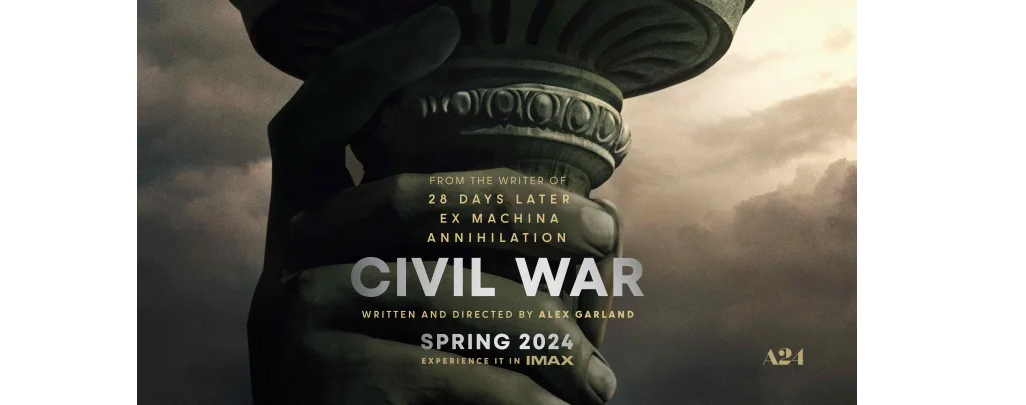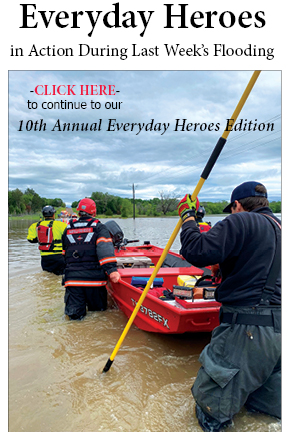By Bob Garver
“Civil War” presents one of the most intriguing premises of the year, maybe of the last several years: what if Texas and California were to secede from the United States and join forces to wage war against their former home country? In short, everyone would lose. The economy would tank so badly that $300 would buy you a ham sandwich or cheese sandwich – but not both. There wouldn’t be a sports stadium left for sports and not crisis centers. Violence and death would lurk around every corner. And needless to say, things would be a nightmare for the press.
Kirsten Dunst stars as Lee Smith, a hardened photographer. She’s not without her compassionate side, giving her life-saving press jacket to stranger Jessie (Cailee Spaeny) during a riot in New York City. But otherwise, she is fearlessly committed to bringing America (whatever that means anymore) the truth about the war. She and her colleague Joel (Wagner Moura) set off to Washington D.C. to get what will likely be the final interview with the President (Nick Offerman) before advancing Western forces inevitably take him. The two are joined by occasionally-annoying tagalong Jessie and veteran reporter Sammy (Stephen McKinley Henderson, always a great scene-stealing presence, and here making the most of his most high-profile role to date).
Much of “Civil War” is a glorified road trip movie largely set in rural areas, which I suppose makes sense since the movie can’t afford to show major cities getting torn to pieces in every scene. But the small-scale villains are even scarier than the large-scale ones, with fewer authorities than ever around to keep them in check. The team visit a gas station where thieves are tortured for as long as the captors can have fun torturing them. Even worse is a militia group filling a mass grave of civilians that were probably not killed as an act of war, but whose disappearance will probably be lazily blamed on the war.
“Civil War” can’t be bothered to answer all the questions it raises, like those involving the origins of the war. Given that Texas and California are the states that seceded, I can only assume that immigration was a major factor, though details are left unclear. Not all the violence in this movie is about the war anyway, some people just want an excuse to shoot people they don’t like. In fact, it’s not necessarily people they don’t like – some people just want an excuse to shoot people regardless of what they represent. Humanity is forever on the edge of destroying itself from within and all that.
Watching “Civil War” reminded me of “The Purge” with its mass violence with or without sense. That franchise started off as a pretty standard home-invasion thriller with lots of bells and whistles about the overlying concept of The Purge that weren’t really necessary for the small-scale conflict. The sequels got deeper into why people needed to kill for reasons other than revenge, while at the same time expanding the scale of the action with ever-growing budgets. Maybe there’s a future for “Civil War” as a franchise. The sequels will need to spend more money, though, because the D.C.-set finale of this movie looks rushed and cheap.
“Civil War” might be onto something as a first chapter in a series that will have many sequels and prequels. On its own, however, I found it bland. There are certainly some powerful scenes, like one with an unbilled Jesse Plemmons as a militia member chillingly doling out death sentences according to his whims. The stars of Moura, Spaeny, and Henderson are deservedly going to rise thanks to their performances here, though I can’t be the only one who walked out of the theater thinking that Spaeny’s character was responsible for too many deaths for her character to be likeable. I can’t say the film lives up to the ambitiousness of its premise, but with more worldbuilding in future installments, there’s potential here for a memorable dystopian future.
Grade: C
“Civil War” is rated R for strong violent content, bloody/disturbing images, and language throughout. Its running time is 109 minutes.
Contact Bob Garver at rrg251@nyu.edu.





